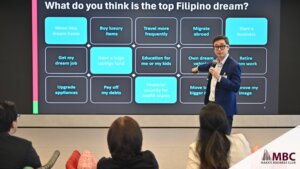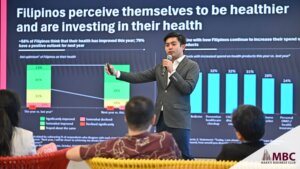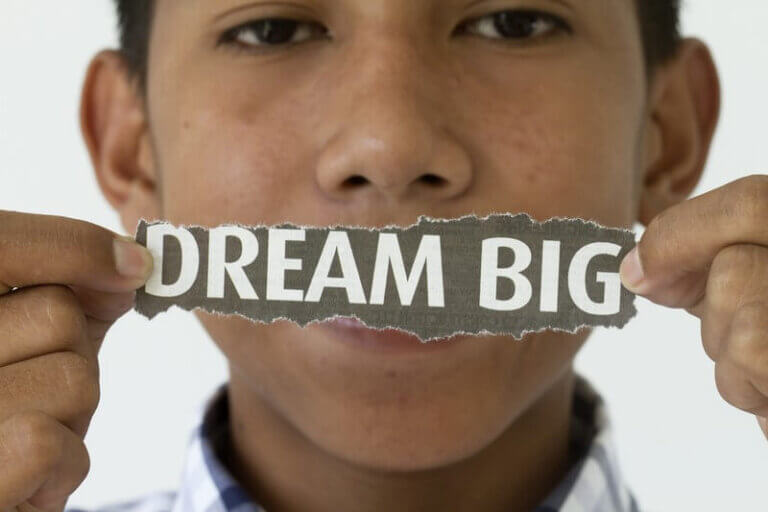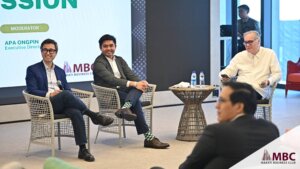On April 10, 2025, the Makati Business Club (MBC)’s Global Ideas Committee, in partnership with the Boston Consulting Group (BCG), hosted a compelling discussion around BCG’s groundbreaking report, The Filipino Dream, which was published in November 2024. Julian Cua, Managing Director and Partner at BCG Manila, and Lance Katigbak, Principal at BCG Manila, led the conversation, uncovering the collective aspirations of Filipinos and the challenges they face in realizing them. Their insights are designed to inspire corporate strategies that empower businesses to better understand and support Filipinos in their pursuit of their dreams.
The Filipino Dream: A Vision for the Future
What is the Filipino Dream? While we often hear of the American Dream, the Chinese Dream, or even the Singapore Dream, there has been little formal exploration of what dreams fuel the hearts of Filipinos. That is, until now.
Boston Consulting Group (BCG) took a deep dive into this very question and surveyed 1,400+ Filipinos across gender, age, geography, and income levels. The goal? To understand the dreams that drive us—and what holds us back.

The Top 4 Filipino Dreams
🌟 Financial security in case of health emergencies
🌟 Starting a business
🌟 Building a large savings fund
🌟 Owning a dream home
These dreams are deeply interwoven with personal and family welfare, particularly health. In fact, 2 out of 3 Filipinos place health and well-being above all else. Many fear they are not financially prepared to deal with major health issues, despite having HMOs. COVID-19, no doubt, left a lasting impression—many are now investing in supplements and emergency funds as a first line of defense.
The Entrepreneurial Spirit of Filipinos
Given that we are a nation of aspiring entrepreneurs, the pandemic didn’t just shift our health priorities—it also reshaped our approach to work and income. Business registrations at the Department of Trade and Industry have grown at a compounded rate of 8% annually from 2019 to 2023. Most of these are micro-enterprises: sari-sari stores, food stalls, and live-selling ventures on Facebook. Although these businesses haven’t yet translated into significant wealth, they represent resilience and a hunger for financial independence. Interestingly, 65% of Filipinos preferred to buy from small businesses during the pandemic, and 51% plan to keep doing so.
The Central Role of Family
At the heart of it all, family remains the central motivation. Whether it’s saving money, staying healthy, or building a home, these dreams are not just personal; they are shared. And that collective mindset sets the Filipino Dream apart. While 53% of respondents believe they can achieve their top dream this year, a more optimistic 68% believe they’ll get there next year. Surprisingly, rural Filipinos are more confident than their urban counterparts in achieving their number one dream this year, at 58% and 70%, respectively.
The Struggle to Achieve the Dream
Despite their drive, many Filipinos feel they must do it alone. There’s a general distrust in public institutions, especially when it comes to health care. Even with jobs and side hustles, they’re still battling a rising cost of living and soaring prices of basic goods. Hence, their negative sentiment toward stabilizing their financial condition.

Who Are the Filipino Dreamers?
Boston Consulting Group identified four distinct clusters of Filipino dreamers, each with unique aspirations and challenges. These groups provide a deeper understanding of how different generations and socio-economic backgrounds are navigating the changing landscape of the Filipino Dream:
Providers (35% of respondents)
“Working-class millennials, most of whom are women, who want better lives for their families and put aside their own needs.”
They dream of stability and comfort—owning a dream home, traveling abroad, and sending their children to good schools. Providers are value-conscious, financially savvy, and supportive of entrepreneurship. They trust the banking system and aspire not just to survive, but to thrive for their families’ sake.
Trailblazers (27%)
“Gen Z students or young professionals yearning for independence and an upgraded lifestyle.”
This youthful group embraces risk and craves creative freedom. They seek mentorship and exciting career growth but are skeptical of traditional financial systems. Despite their boldness, many maintain a deep gratitude to their parents and honor familial obligations—an endearing paradox of rebellion and responsibility.
Guardians (26%)
“Older individuals in rural areas, planning to retire after fulfilling family responsibilities.”
Mostly in their 60s or 70s, Guardians often live comfortably but defer retirement until their children are fully independent. They dream of a peaceful life post-retirement—through travel, missionary work, or simply enjoying the fruits of decades of hard work. Letting go of work, however, remains a challenge.
Rebuilders (12%)
“Freelance or self-employed female millennials seeking financial recovery post-pandemic.”
Hit hardest by the crisis, Rebuilders are cautiously optimistic. Their dreams revolve around resilience, reinvention, and uplifting their families. Side hustles and freelancing offer a path forward, even if stability remains elusive.
A Call to Action
This study matters because it’s not just a snapshot of Filipino aspirations—it’s an invitation to understand the core drivers behind their dreams: health, stability, progress, and dignity. For policymakers, business leaders, and community builders, it offers a roadmap of what truly matters to Filipinos: health, stability, and shared progress.
Let’s hope this sparks a national conversation on how we can support and accelerate the fulfillment of the Filipino Dream—together. Let’s design solutions that don’t just respond to needs, but resonate with dreams.
#FilipinoDreamers #Leadership #FutureOfWork #NationInTransition #HumanCapital #InclusiveGrowth
Turn Insights into Action
The Filipino Dream reveals what truly motivates our people: health, family, and opportunity. At John Clements Consultants, we help organizations align with these aspirations through talent solutions that empower individuals and drive business growth.
Ready to make a difference? Contact us today.
Photo Credit: Images sourced from the Makati Business Club’s Facebook post.






